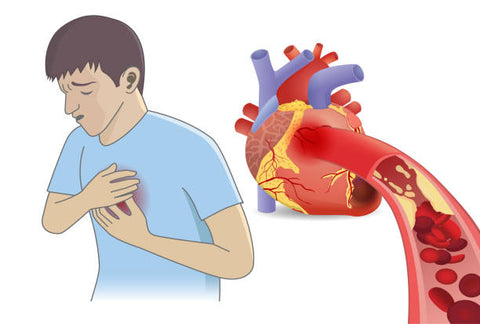Chest pain is a common symptom that can be caused by a variety of conditions. It can range from a mild discomfort to a severe, sharp pain that can be life-threatening. In this blog, we will discuss the causes, symptoms, and treatment of chest pain.

Causes of Chest Pain
Chest pain can be caused by a variety of conditions that affect the heart, lungs, or other organs in the chest. Some of the common causes of chest pain include:
-
Heart attack: This occurs when the blood flow to the heart is blocked, causing damage to the heart muscle.
-
Angina: This is a type of chest pain that occurs when the heart muscle is not getting enough blood and oxygen.
-
Pulmonary embolism: This occurs when a blood clot travels to the lungs and blocks the blood flow.
-
Pneumonia: This is an infection of the lungs that can cause chest pain, coughing, and difficulty breathing.
-
Gastroesophageal reflux disease (GERD): This occurs when the stomach acid flows back into the esophagus, causing irritation and inflammation.
-
Costochondritis: This is an inflammation of the cartilage that connects the ribs to the breastbone.
Symptoms of Chest Pain
The symptoms of chest pain can vary depending on the underlying cause. Some of the common symptoms of chest pain include:
-
Pain or discomfort in the chest: This can be a sharp, stabbing pain, a dull ache, or a burning sensation.
-
Shortness of breath: This can occur with exertion or at rest.
-
Sweating: This can occur with or without chest pain.
-
Nausea and vomiting: This can occur with or without chest pain.
-
Dizziness: This can occur with or without chest pain.
-
Pain in the arms, neck, jaw, or back: This can occur with chest pain, especially in cases of a heart attack.
If you experience any of these symptoms, it is important to seek medical attention as soon as possible.
Treatment of Chest Pain
The treatment of chest pain depends on the underlying cause. If the chest pain is caused by a heart attack or angina, immediate medical attention is necessary to prevent further damage to the heart. Treatment may include medications to dissolve blood clots or improve blood flow to the heart, as well as procedures to open blocked blood vessels.
If the chest pain is caused by a pulmonary embolism, treatment may include blood thinners to prevent the blood clots from getting larger or new ones from forming. In cases of pneumonia, antibiotics are usually necessary to treat the infection.
If the chest pain is caused by GERD, treatment may include changes to the diet, medications to reduce the acid production in the stomach, or surgery in severe cases. Costochondritis can be treated with over-the-counter pain medication or prescription medication in severe cases.
In conclusion, chest pain is a common symptom that can be caused by a variety of conditions. If you experience chest pain, it is important to seek medical attention as soon as possible to determine the underlying cause and receive appropriate treatment. With prompt treatment and care, many cases of chest pain can be managed effectively, allowing for a full and active life.












